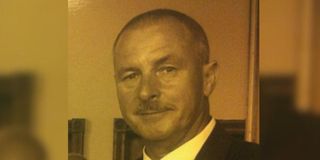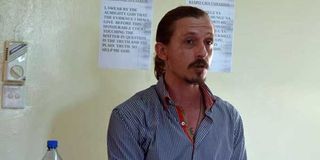Premium
Harry Roy Veevers: No resting in peace for British tycoon, 10 years on

Harry Veevers from Rochdale, UK, died at his home in Kenya in 2013.
What you need to know:
- Harry Roy Veevers died on February 14, 2013, in Mombasa County.
- The cause of Veevers' death has been a subject of judicial proceedings.
The remains of British businessman Harry Roy Veevers will not be released for reburial, at least for now, but the inquest file will be reopened and proper judgment delivered to determine the circumstances which led to his death.
Veevers died on February 14, 2013, in Mombasa County and since then, the cause of his death has been the subject of judicial proceedings.
The High Court in Mombasa has directed that the inquest file be returned to the magistrate court, reopened and additional submissions be taken from both parties before a proper verdict can be arrived at.
Justice Ann Ong'injo has ruled that it was irregular for Principal Magistrate Charles Ndegwa to deliver a ruling without notice to the advocates, particularly the one representing the deceased’s sons, who had applied to be supplied with certified copies of the proceedings in order to file written submissions.
“This court, therefore, finds that the irregularity needs to be corrected by reopening the inquest file, allowing submissions to be filed and a ruling written and delivered based on the evidence tendered by witnesses in the inquest and submissions filed,” said the judge.

Richard John Veevers, the eldest son of British tycoon Harry Roy Veevers, who died mysteriously in Mombasa in 2013, testifies at an inquest to determine the cause of death at the Shanzu Law Courts in Mombasa on October 22, 2015. He told the inquest that post-mortem results showed his father died of cyanide poisoning.
The judge also noted that there was no evidence that typed proceedings were supplied to Mr Kinyua Kamundi, who is representing the deceased's sons in the dispute.
Further, there was no evidence or anything to show that the file was forwarded to Mr Ndegwa to consider the evidence of witnesses who testified.
Make a determination
The judge, therefore, referred the inquest file back to Chief Magistrate Alex Ithuku to allocate it to a magistrate to receive submissions and make a determination.
On the request to release the body to the deceased’s sons for further proceedings in the United Kingdom before interment, the judge said her court is not seized of the jurisdiction to issue such orders.
“This is because the ruling in the trial magistrate's court did not make any determination as to which party should inter the body, that application should be canvassed in the proper forum,” said Justice Ong'injo.
By a letter dated February 7, the deceased's sons, Richard John Veevers and Philip David Veevers, asked the High Court to call the inquest file to revise Mr Ndegwa's ruling dated December 23, 2023 and delivered on January 15, this year.
Through their advocate Mr Kamundi, they asked that the ruling be declared null and void and be set aside in its entirety.
“We also ask that the inquest file be reopened and written and oral submissions be made and a proper ruling on the inquest be delivered after analysing all the oral and documentary evidence and considering the written and oral submissions of all parties," said the advocate.
John and David based their application on grounds that those suspected of causing the unlawful death of their father, concealing the body and burying it without a postmortem under a false name, had applied to have the body released to them.
They also argued that one of the witnesses in the inquest, who is a scientist in the UK, and who is holding specimens in respect to the inquest, may dispose of them yet they intend to have another inquest by the coroner in the UK as soon as the body arrives there.
In response, Veevers’ widow and her two daughters opposed the application, arguing that the trial magistrate's ruling concluded that there was someone criminally responsible for the death of the deceased.
“The magistrate's final finding was sound in law; this application is based on speculation and conjecture,” they said through lawyer William Mogaka.
They asked the Judge to dismiss this application noting that the question of the cause of the deceased's death had already been settled by the magistrate therefore the matter should be put to rest.
Ms Alexandra Veevers gives her testimony at Mombasa Law Courts on May 3, 2017 during an inquest into the death of her father Harry Roy Veevers.
Roy's sons have been at loggerheads with their half-sisters Alexandra and Hellen Veevers and their mother Azra Parvin Din over the death of their father.
In January this year, Mr Ndegwa closed the inquest file after years of trial, with a conclusion that no evidence was tabled implicating anyone in the tycoon's death.
However, Mr Richard and Mr David moved to the High Court protesting how the entire inquest was conducted at the magistrate court.
They have complained to the High Court that they are disappointed with Mr Ndegwa's verdict, which held no one legally accountable for the tycoon's death following a 10-year judicial investigation.
They claim that the magistrate did not realise that he was conducting an investigation into the deceased's cause of death rather than hearing a criminal case.
According to the two sons, the magistrate was expected to inquire into all lines of investigation and render a decision wherever the facts led.
“As an investigator, he ought to have considered evidence from all the witnesses and not just the evidence of one out of 16 witnesses. If he did not intend to consider evidence of all witnesses then he should have informed the parties and saved them the expense of travelling to Kenya on multiple occasions,” said the brothers.
They have complained that the ruling was delivered prematurely before all parties could file their final submissions and signed on a Saturday in the absence of all parties.
“Mr Ngegwa never considered any of the evidence contained in the over 300 typed proceedings and over 40 exhibits other than the evidence by the Chief Government pathologist that he was unable to determine the cause of death. Inability to determine the cause of death does not mean our father did not meet his death in most suspicious circumstances,” they said.
According to them, the inquest was not just about determining who killed their father, but also about failure to notify his unexpected and unexplained death to the police, stealthy removal of the body from the scene and interference with the crime scene.
They claimed that the court was obligated to evaluate the damping of the remains in a private morgue with no registration or documentation and also why a general medical practitioner issued a death certificate stating the cause of death without conducting a postmortem examination.
Other issues they want investigated include switching the specimens, breaching the chain of custody, submitting incorrect specimens to a UK laboratory for toxicology, and burying the deceased without a postmortem.
Changing the deceased's identity
They have also expressed concerns about falsely changing the deceased's identity by giving him a Muslim name and burying him as Akbar Harry Roy Veevers.
“These are serious offenses against the administration of justice. They also indicate a guilty mind, and Mr Ndegwa, as an investigator, should have recalled a pathologist for further examination to explain the switching of the samples,” they said.
According to the brothers, there was an intention to avoid and discard all evidence that pointed to the commission of any offense to protect certain actors in the inquest.
On why Mr Richard is the proper and suitable person to whom the body should be released, he says he is the firstborn son and it is the custom that he takes charge of the arrangements.
He explains that the body should not be released to the deceased second wife Ms Parvin since she was not married to the deceased and therefore not a widow.
They argued that the woman is also a Muslim hence Muslim women do not handle burials and that his father was a Christian.


